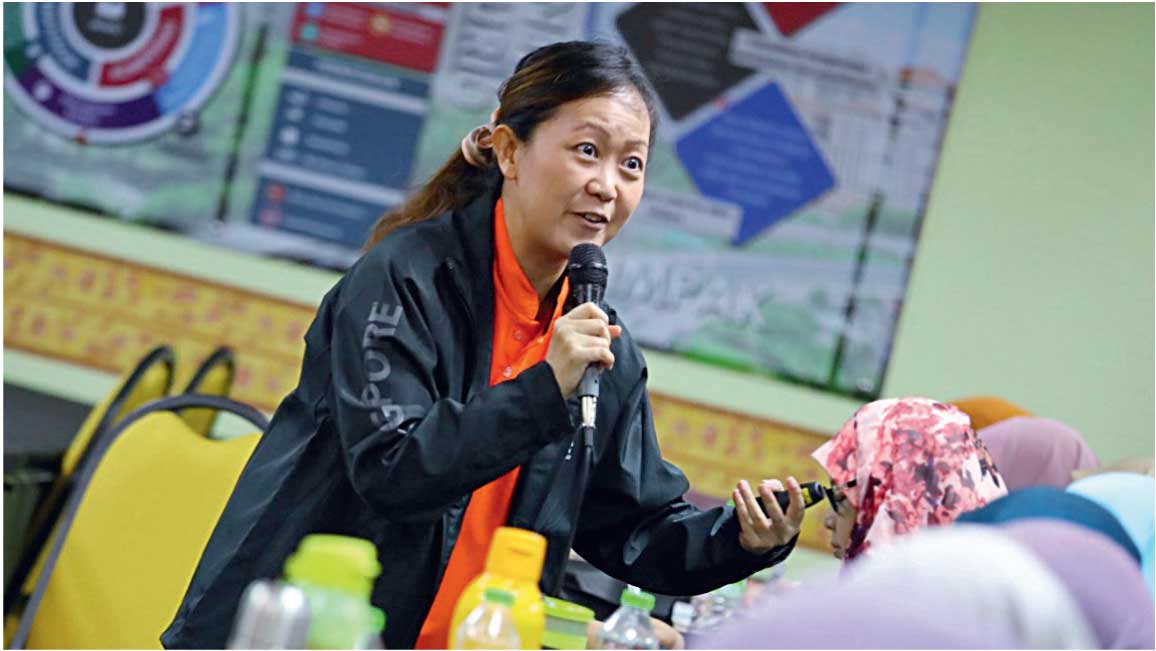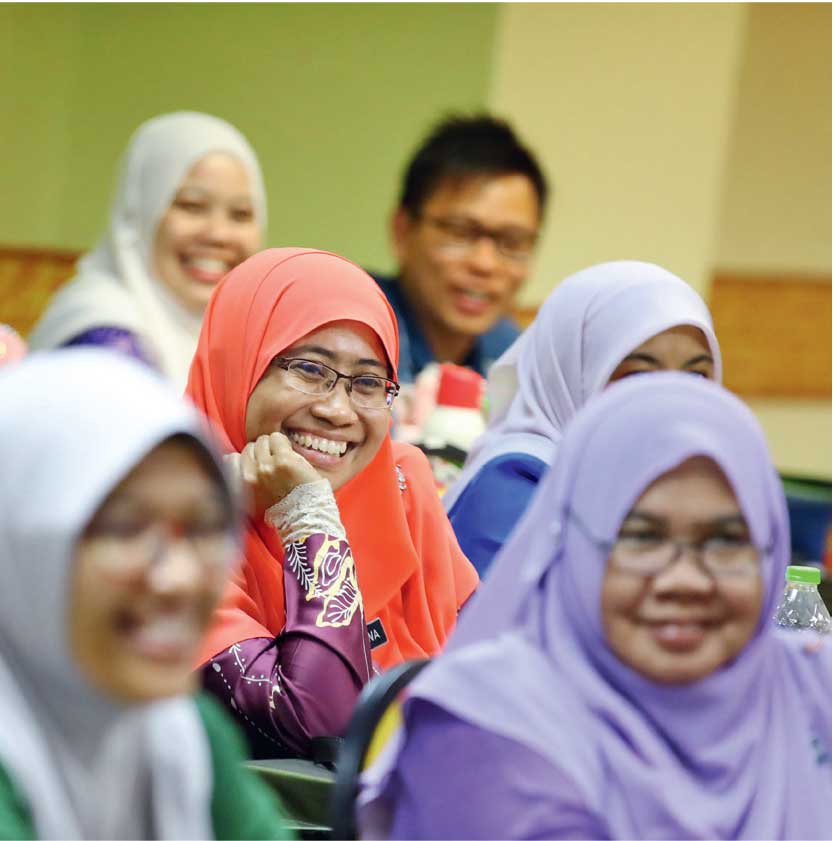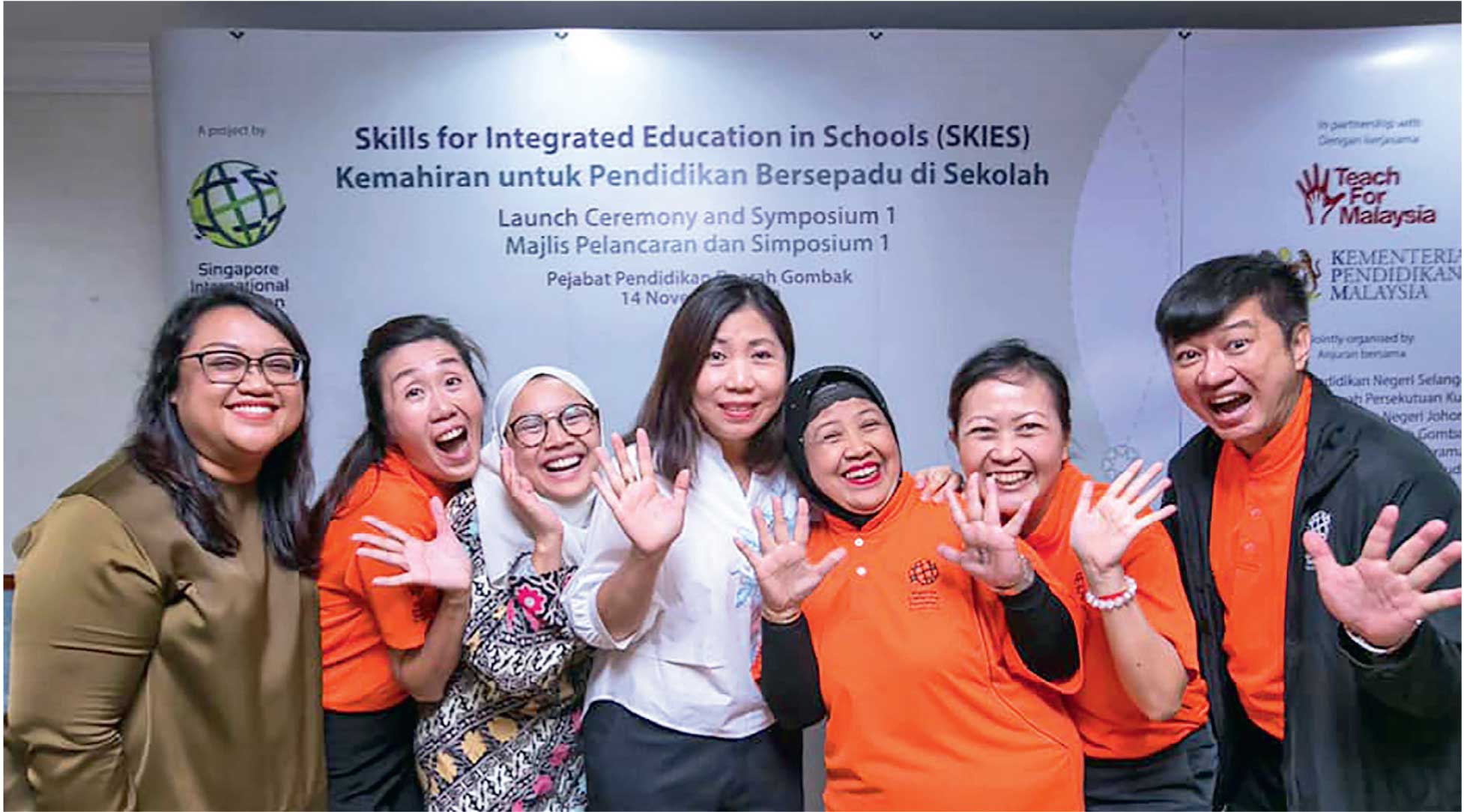Stories > Reading a Classroom
Reading a Classroom
Working with teachers of diverse nationalities has taught SIV Tang Swee Noi the importance of culturally appropriate curriculum development.
BY YE SUI LING


Tang Swee Noi, a seasoned volunteer in the education sector, has worked with and trained teachers from different international communities such as Malaysia, Indonesia and the Philippines.
eteran educator and Singapore International Volunteer (SIV) with the Singapore International Foundation (SIF) Tang Swee Noi frames her passion for volunteering in a self-deprecating manner. “Being a kaypoh [busybody], I’m driven to help when I can. It’s partly because I feel education is a huge leveller that I myself have benefitted from,” she says.
The adjunct lecturer, 45, at Singapore’s National Institute of Education, who is part of a group of SIVs working to enhance teachers’ expertise at Malaysian public schools, reveals that she does not hail from a privileged background.
Education and the solicitousness of her past mentors, she asserts, have paved her career path. This has led her to plum roles such as the dean of elite school Raffles Institution’s talent development programme, as well as head of teaching and learning at autism-focused institution Pathlight School.
Unsurprisingly, the concept of paying it forward resonates with the well-accomplished educator. “When you are bogged down by the system, you only see obstacles. But I like to show people possibilities,” she muses. This philosophy was elucidated to her during a 1½-year stint spearheading curriculum planning as well as professional development for teachers at an international school in Medan, Indonesia, in the 2000s.
Describing herself as something of an ingenue back then despite her experience, Tang says working in an environment confined by a paucity of resources overturned her world view.
A WELLSPRING OF POTENTIAL
While overseas, the Singaporean began to place meaning behind the axiom that teaching is a calling. “I worked with teachers from all over the world, and they – especially Filipino teachers – showed me what creativity is. I realised that their desire to teach is innate and not solely fuelled by financial motivations,” she explains, adding that raising educators’ remuneration was then a trending topic in Singapore.
I WORKED WITH TEACHERS FROM ALL OVER THE WORLD, AND THEY SHOWED ME WHAT CREATIVITY IS. I REALISED THAT THEIR DESIRE TO TEACH IS INNATE AND NOT SOLELY FUELLED BY FINANCIAL MOTIVATIONS.
While this may sound like fulsome praise, Tang says that her Filipino counterparts impressed her with their improvisational skills, procuring cleaning equipment as a substitute to unavailable chemicals required to conduct science experiments, and constructing an anatomical skeleton model from recycled materials. In turn, her colleagues embraced new paradigms of teaching. “The teachers were passionate, and, over time, became more cognisant of how they could make learning accessible for their students. To me, that is pedagogical learning,” she says.
Pedagogical learning – whereby teachers acquire an array of tools to improve students’ learning outcomes – has been a cornerstone of Tang’s career, having helped build teachers’ capabilities both locally and overseas. “Students have their own capacity to learn, but pedagogy helps teachers to see students’ potential, despite the labels given to them,” she explains.
Over time, Tang has witnessed the impact of pedagogical learning on both teachers and students across a spectrum of nationalities and learning abilities. “In Indonesia, the kids established a great rapport with their teachers through inquirybased learning,” she recounts.
A WELLSPRING OF POTENTIAL
It’s the same student-centred approach that underscores Skills for Integrated Education in Schools (SKIES). The ongoing SIF project sees Tang’s team partnering non-profit organisation Teach For Malaysia and 200 Malaysian teacher trainees from primary and secondary schools in Kuala Lumpur, Selangor and Johor to exchange knowledge, skills and best practices in areas including teacher empowerment, classroom management and programme development. The three-year project, which kicked off with a symposium in November 2019, is expected to benefit over 26,000 teachers, students and parents.
While Tang observed considerable enthusiasm from the Malaysian teachers, who expressed interest in learning new pedagogies, she stresses that her Singaporean teammates were careful not to foist their norms on them. “We wanted to explore different possibilities only after discovering their experiences and difficulties, instead of adopting a didactic approach,” she explains. While she admits this has been challenging, given how plans to visit the schools have been scotched by travel restrictions due to Covid-19, she looks forward to parsing the results of a survey conducted by Malaysia’s Ministry of Education for insights.

Tang (second from right) and her team have focused on understanding the needs of Malaysian teachers from different states to help in the areas of capacity-building and inter-state networking.
During the symposium, I observed that we are more similar than we are different. Both Singaporean and Malaysian teachers are keen to reach out to a new generation of students with a unique point of view.
Tang Swee Noi, educator and volunteer
Having previously undertaken a two-month stint researching 21st century competencies with UNESCO, Tang eschews ethnocentrism for an acute awareness of cultural context. While, this viewpoint has informed the way she tailors curriculum and pedagogy for different demographics, she cautions against its wholesale adoption without context.
She discovered, through SKIES, for instance, that religion is intertwined with various aspects of life in Malaysia. “My fellow teammate, who is Muslim, engaged the local teachers during the symposium by quoting teaching-related verses of the Qur’an,” she shares, adding that the Singaporean teachers bear in mind that English is not the first language of the Malaysian teachers.
For Tang, navigating the programme amid an ongoing pandemic has been an uphill task, with internet connectivity issues precluding some Malaysian teachers from attending online classes. The team has just concluded an e-learning trial with a sample group of participants to assess the suitability of digital capacity-building workshops. To circumvent technical hiccups, they are also assessing the feasibility of sharing information through encrypted messaging platforms such as WhatsApp.
However, Tang remains sanguine. While she admits that they are still in the process of understanding the needs of Malaysian teachers from disparate states, a recent segment she led on reflective practice helped them to place the potential challenges caused by Covid-19 into context. Following this, she will work on devising strategies together with the teachers.
Though the programme is still in its liminal stages, she postulates a compatibility between the ideals of both Malaysian and Singaporean educators. “Both Singaporean and Malaysian teachers are keen to reach out to a new generation of students with a unique point of view,” she suggests.
With that being said, she notes that some Malaysian teachers were well trained and exposed to new ideas in pedagogical development. “What we are trying to do is start conversations, help explore possibilities, and build confidence through networking with their counterparts from other states,” she asserts.
And despite brief interactions with her Malaysian counterparts, she notes their affability and open-mindedness. “During the symposium, I observed that we are more similar than we are different. The Malaysian teachers seemed to welcome a different perspective, instead of viewing us as outsiders,” she shares.
Tang is certainly buoyed by her belief in the merits of mutual learning. “Working with both local and international organisations, I have gleaned that everybody has something to bring to the table,” she concludes.
|
CITIZEN AMBASSADOR The work of the Singapore International Foundation (SIF) is not possible without the support of many Singaporeans who generously give of their time and talent. Their collective efforts bring us closer to becoming a nation of responsible global citizens. Singaporeans play the role of Citizen Ambassadors (CA) when they volunteer to work alongside their overseas counterparts to shape new realities, while fostering greater intercultural understanding. A CA is a friend of the world – someone who recognises that Singapore sits within the global community and that there is a need for greater understanding between countries in order to build a better, more peaceful and inclusive world.
As key enablers of our work, all our CAs abide by the SIF Global Citizens Charter, which sets out the principles, values and behaviours expected of them, based on the SIF’s mission and core values. 
Scan here to find
|
